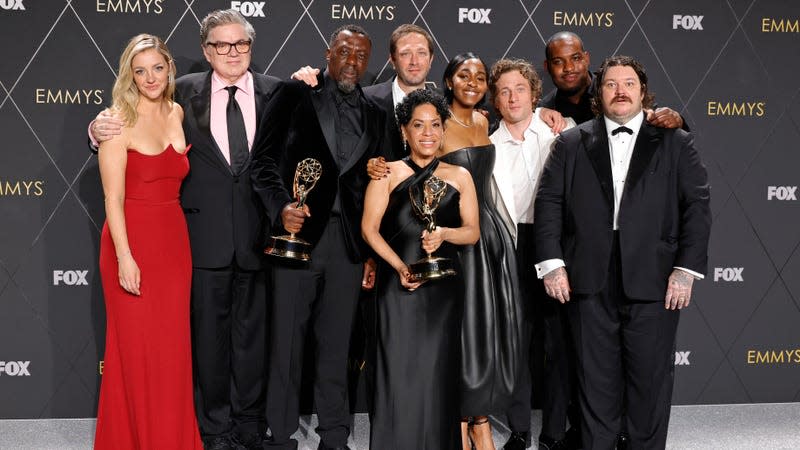The Bear cast is over the comedy question

- Oops!Something went wrong.Please try again later.
- Oops!Something went wrong.Please try again later.
- Oops!Something went wrong.Please try again later.
- Oops!Something went wrong.Please try again later.
- Oops!Something went wrong.Please try again later.
- Oops!Something went wrong.Please try again later.
As The Bear sweeps award show after award show—culminating in 10 wins at the 75th Emmy Awards—an age-old debate has reached a fever pitch: is this show a comedy? The cast and crew of The Bear think so, and they seem a little bothered by the question. Just listen to the tone of stars Ayo Edebiri and Jeremy Allen White’s voices after winning Best Comedy and being asked if people “find a lot of laughs in your show.” “Yes,” they both answered emphatically, as in, yes, obviously. But what is a television comedy and a television drama is not as obvious as you might think.
“I think the show is true to life, and sometimes it’s funny and sometimes it’s real,” The Bear executive producer Josh Senior told press at the Emmys, noting that the writers want to “tell the truth and make people feel things.” He added that “The show is roughly a half-hour long and that fits in the box of a comedy.” Similarly, Ebon Moss-Bachrach said that “We got bunched in, we got into comedy because we’re half-hour.”
Here’s the thing: a half-hour television show does not a comedy make. That used to be the Emmys’ rule from 2015 to 2021, when the Television Academy was figuring out how to categorize content in an era of increasing dramedies. But we’ve also been living through an era of evolving television form, and the time limit on TV categories (30 minutes for comedies, 40+ minutes for dramas) boxed out some straightforward comedies like Crazy Ex-Girlfriend or The Marvelous Mrs. Maisel. So in 2021, the Emmys removed program time as a consideration for categorizing shows. Now, the responsibility falls to a show’s producers to decide in which category their series will compete, “with the stipulation that the Television Academy’s Industry Panel reserves the right to review the producer’s preference.” The only guideline is that “the content is primarily comedic for comedy series entries or primarily dramatic for dramatic series entries.”
The Bear is undoubtedly funny—Moss-Bachrach and Edebiri both justifiably pointed towards the first season episode in which the restaurant gets a C grade from the health department as a comedy stand out (per Deadline)—but is the show “primarily comedic”? Much of the Internet would disagree, especially compared to a competitor like Abbott Elementary. Abbott is a clear example of a show that’s “primarily comedic,” while The Bear exists in more of a gray area. How do you decide whether comedy or drama is the “primary” characteristic of a show?
As Moss-Bachrach pointed out, these lines are getting blurred all over television, not just on The Bear. “Between, like, Succession and BEEF and our show, I feel like these ideas about comedy and drama are a little bit outdated,” he said in the Emmys press room (via TV Guide). “We’re all just trying to reflect the mess of being human, which is deeply hilarious and we’re all suffering.”
This year’s Emmys will certainly not be the last time the comedy vs. drama debate will rear its head, especially if one or two shows continue to dominate the awards conversations at the expense of others. (By the way, those 10 wins were for the first season of The Bear, so you can expect them to be back in the mix at next year’s ceremony for the critically acclaimed second outing.) The way forward is unclear. Should Emmys voters be looking at jokes-per-minute? Should the Television Academy introduce new categories to allow for more nuance? Categorizing by program time didn’t work, and judging the content by its “primary” traits hasn’t solved the issue. Seems like it’s time to go back to the drawing board for new solutions.

